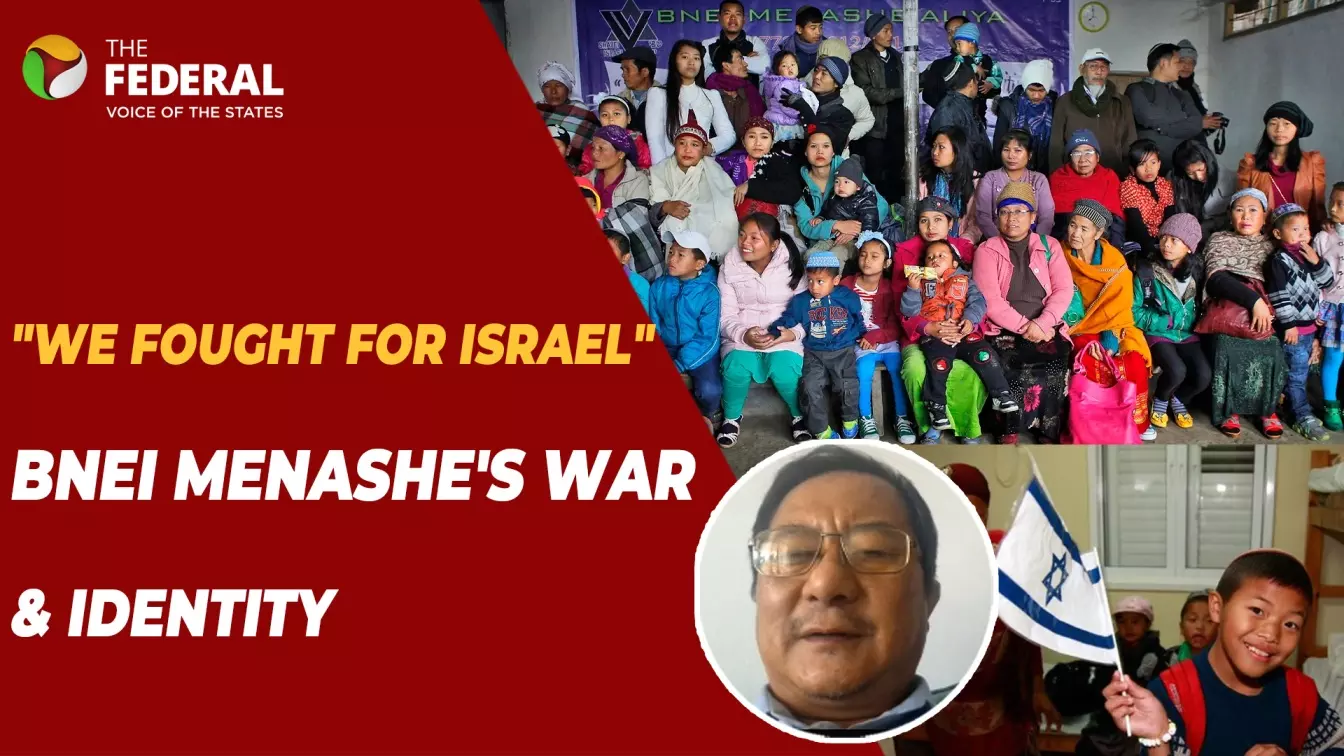
Israel-Iran conflict: Why tiny Bnei Menashe community is concerned
From Mizoram to Jerusalem, the Bnei Menashe community’s journey raises big questions about identity, faith, and belonging

As the Israel-Iran conflict escalates, a small community from India finds itself caught in the crosshairs. The Bnei Menashe — an ethnoreligious group from Manipur and Mizoram who believe they are descendants of a lost tribe of Israel — have long struggled to integrate into Israeli society. Issack Thangjom, project director of Degel Menashe, speaks with The Federal’s Samir K Purkayastha about the community’s contribution to Israel’s defence, their cultural journey, and what the future holds.
What is the situation on the ground in Israel following the ceasefire?
There’s a sense of uneasy calm. The ceasefire was announced yesterday (June 24), and since this morning, no rockets or missiles have been fired. But just before it was declared, we had to run to bomb shelters six times. The previous 12 days were especially tense due to Iran entering the conflict with more sophisticated missile attacks, far more serious than the homemade rockets from Gaza.
Also read: Trump’s attack on Iran, a ‘spectacular’ failure of US foreign policy
What role has the Bnei Menashe community played in this conflict?
The community is fully integrated into Israeli society, and with compulsory military conscription, many young men and women from Bnei Menashe serve in the Israeli Defense Forces (IDF). Two boys from our community were killed in combat last year. Though there haven't been casualties this year, we are very much part of the national effort.
How are people managing daily life amid the ongoing war?
Life goes on. We go to work every day, and normal routines continue despite occasional missile warnings. The confrontations are mostly confined to border areas. However, the recent Iranian attacks have been alarming — these are advanced ballistic missiles and drones, and their impact is thunderous. Thankfully, every home in Israel has a bunker shelter, which has saved countless lives.
Also read: The multiple casualties of US attack on Iran
How do Israelis feel about the ceasefire?
There’s general fatigue. People are tired of repeated attacks from Gaza, Lebanon, and Iran’s proxies. There is strong support for the government to finish the job and secure lasting peace, even if it means sacrifices in the short term.
Can you walk us through the origins of the Bnei Menashe migration to Israel?
The movement began in Mizoram in the 1950s, led by a seer named Chala who declared that the Kuki-Chin-Mizo people were descendants of Israel’s lost tribe. People began exploring their customs and found parallels with the Bible. In the 1970s, we came in contact with Rabbi Eliyahu Avichail in Jerusalem and began formally embracing Judaism. The first wave of migration started about 35 years ago.
Also read: Iran says nuclear facilities badly damaged by US airstrikes
What’s the current population of the Bnei Menashe in Israel and India?
About 10,000 — roughly 5,000 each in Israel and India. The Israeli government is working to bring over the remaining members. We believe it’s just a matter of time before all 5,000 are brought home.
What is the process for migration and citizenship in Israel?
It requires approval from Israel’s Knesset and the Prime Minister’s Office. Once approved, migrants are given immediate citizenship, provided they identify as Jewish. The government has a well-organised absorption programme covering housing, education, and Hebrew language training to ensure smooth integration.
How is the community preserving its cultural identity while integrating into Israeli society?
Israel is home to people from over 120 countries. Everyone is a minority. The government supports cultural preservation, but the initiative must come from the community itself. Most first- and second-generation members still speak Kuki-Mizo languages at home, but Hebrew dominates public life. Third-generation children are less likely to retain native languages.
What does Degel Menashe do to support the Bnei Menashe?
Our mission is to assist with immigration and integration. In the last five years, we’ve awarded over 100 scholarships to improve access to higher education. During COVID-19 and the ethnic conflict in Manipur, we provided humanitarian aid. We’ve also built a self-sustaining community for displaced people with a school and synagogue on land provided by the Bnei Menashe Council.
Is Degel Menashe’s work limited to Indian Jews?
Yes, our focus is specifically on Bnei Menashe from Manipur and Mizoram. There may be individuals from the community elsewhere, but we don’t work with other Jewish immigrant groups.
What is the biblical basis for the community’s claim to be from the tribe of Manasseh?
We have an eponymous ancestor named Manmasi whose story mirrors the biblical account of the tribe of Manasseh, one of Joseph’s sons and a grandson of Jacob (also known as Israel). Our oral traditions and cultural practices align closely with narratives from the Old Testament, including Exodus.
(The content above has been generated using a fine-tuned AI model. To ensure accuracy, quality, and editorial integrity, we employ a Human-In-The-Loop (HITL) process. While AI assists in creating the initial draft, our experienced editorial team carefully reviews, edits, and refines the content before publication. At The Federal, we combine the efficiency of AI with the expertise of human editors to deliver reliable and insightful journalism.)

